2022 Commercialization Fellowship Looks to Future
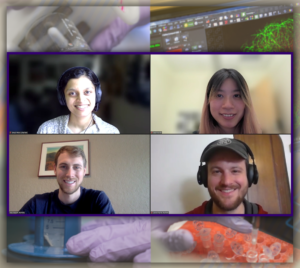 Once something truly innovative and new is created, a final step remains. Where will this potentially groundbreaking idea have its biggest impact? What is the best market for it to call home? Finding the answer to those questions makes for a unique kind of summer job for four University of Washington graduate students. The 2022 summer cohort of the ITHS/WRF Summer Commercialization Fellowship Program (hosted by the Foster School’s Buerk Center for Entrepreneurship) is delegated the challenge of finding product-market fit for some exciting new ideas being worked on in research labs at UW or through its partners. The end goal is to deliver solid business and market assessments on the commercial potential of these projects.
Once something truly innovative and new is created, a final step remains. Where will this potentially groundbreaking idea have its biggest impact? What is the best market for it to call home? Finding the answer to those questions makes for a unique kind of summer job for four University of Washington graduate students. The 2022 summer cohort of the ITHS/WRF Summer Commercialization Fellowship Program (hosted by the Foster School’s Buerk Center for Entrepreneurship) is delegated the challenge of finding product-market fit for some exciting new ideas being worked on in research labs at UW or through its partners. The end goal is to deliver solid business and market assessments on the commercial potential of these projects.
“The student fellows chosen this year represent as unique a mix of potential and background as the projects they were paired with,” said Buerk Center assistant director and Hollomon Health Innovation Challenge manager Jessica Roberto. “We’re excited to see the students put what they’ve learned both in and out of the classroom into practice. They will reveal the market potential of ideas that address issues many around the world face today.”
The students were selected after a competitive application process and began working for a minimum of 30 hours a week on the projects in late June. The 10-week paid Fellowship wraps up in late August. The program this year is made possible because of support from the Institute of Translational Health Sciences (ITHS), the Washington Research Foundation, and for the first time, the Department of Energy’s ARPA-E initiative. The Fellows are also supported through a partnership with UW CoMotion.
2022 FELLOWSHIP PROJECT – ANALYTICAL LIPID SIGNALING PLATFORM
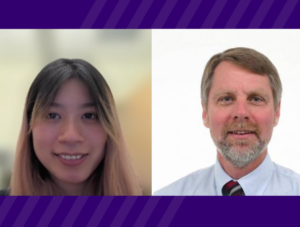 What if you could take processes used to create incredibly small semiconductors and use it for drug screening instead of circuits? That’s the basis for a new novel technology out of UW that received a CoMotion Innovation Gap Fund award last fall. It measures the biochemical activity of key lipid enzymes and their pathways in living cells that lead to things like tumors being formed, auto-immune reactions, and even viral infections. Ultimately, it’s the kind of thing that could have a massive impact on the way researchers identify the drug candidates most likely to be effective.
What if you could take processes used to create incredibly small semiconductors and use it for drug screening instead of circuits? That’s the basis for a new novel technology out of UW that received a CoMotion Innovation Gap Fund award last fall. It measures the biochemical activity of key lipid enzymes and their pathways in living cells that lead to things like tumors being formed, auto-immune reactions, and even viral infections. Ultimately, it’s the kind of thing that could have a massive impact on the way researchers identify the drug candidates most likely to be effective.
Bioengineering PhD student Zhiying (Sabrina) Xie paired with Bioengineering and Medicine Professor Christopher Sims, M.D. on the project he co-created alongside the Dean of Engineering (and Bioengineering professor) Nancy Allbritton. Xie said she’s excited to dig deeper into the pre-clinical drug screening market that this technology could be impactful in because of her background.
“I have a very deep background understanding molecular biology and I’ve done related research,” she said. “I want to help fill in the gap between research and commercialization.”
She was turned onto the program after hearing feedback from a member of last year’s fellowship cohort and how much they learned from it. She also plans on continuing her own research after graduation and hopefully starting her own commercialization journey.
“I like working with startup companies,” she said, “and I want to understand how I can apply what I learn here to the research I do in the future.”
Outside of the fellowship, Sabrina enjoys fishing. Recently, she said she just started getting into racing as well.
2022 FELLOWSHIP PROJECT – PARENT-CHILD SHARED ASTHMA MONITORING SYSTEM
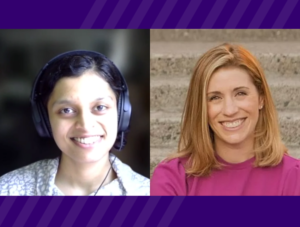 Asthma represents such a major problem across the U.S. (and world) that most people would be hard pressed to find someone they know who hasn’t heard of it. It’s the most common chronic condition of childhood in the U.S. with an estimated 1 in 12 school age children impacted by it. For many, its uncontrolled, leading to at least one serious attack a year. The need to create an “early warning system” drove Jennifer Sonney, PhD, ARNP, PPCNP-BC, FAANP, from the Department of Child, Family, and Population Health Nursing at UW to innovate a new solution. The result is the Improving Asthma Care Together, or IMPACT, system. It facilitates real-time symptom monitoring via a wearable device for children. Alongside a mobile app used by the parents, it guides families on how to responsibly plan to manage asthma together.
Asthma represents such a major problem across the U.S. (and world) that most people would be hard pressed to find someone they know who hasn’t heard of it. It’s the most common chronic condition of childhood in the U.S. with an estimated 1 in 12 school age children impacted by it. For many, its uncontrolled, leading to at least one serious attack a year. The need to create an “early warning system” drove Jennifer Sonney, PhD, ARNP, PPCNP-BC, FAANP, from the Department of Child, Family, and Population Health Nursing at UW to innovate a new solution. The result is the Improving Asthma Care Together, or IMPACT, system. It facilitates real-time symptom monitoring via a wearable device for children. Alongside a mobile app used by the parents, it guides families on how to responsibly plan to manage asthma together.
Electrical and Computer Engineering PhD candidate Shruti Misra signed on to help evaluate the commercialization prospects for IMPACT in part because it’s personal. “I have a cousin who suffered through asthma, and I know people who’ve suffered from it,” she said. “Seeing the actual struggles and how impactful technology could be to help caught my eye. I have expertise in embedded systems engineering and like working with medical devices.”
Shruti spent the past academic year being involved in the Foster School’s Technology Entrepreneurship Certificate program and the Creative Destructive Lab. She says she met her cohort colleague Sabrina through the latter and finds working with startups really exciting.
“I’m looking at focusing on things like product management in the future,” she said. “Or given where my research is, other possible areas like data science and user design.”
In addition to the fellowship, Shruti is working on refining her newfound love for drumming and music production. She also enjoys photography and travel.
2022 FELLOWSHIP PROJECT – HIGH-THROUGHPUT PRE-CLINICAL TESTING FOR LIVER TOXICITY
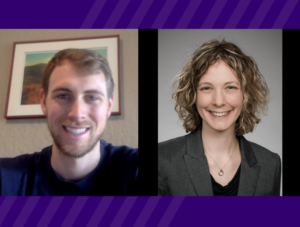 There’s no end to the common frustration of how long it can take potentially impactful drugs to go from discovery to market. It might surprise most how much it can cost as well—Roughly $2.6 billion dollars in research and development is the average, with about 60% of that incurred during the pre-clinical testing phase used to identify a lead candidate. Even with all of that investment, only 12% of lead candidates even pass clinical trials, most often failing due to human liver toxicity. With that in mind, Kelly Stevens from UW’s bioengineering and pathology departments has focused her lab on new technology to assemble synthetic human tissues from stem cells. The “bio-printing” of something like liver tissue could drastically increase the efficiency of the aforementioned pre-clinical testing phase by allowing toxicity to be evaluated earlier.
There’s no end to the common frustration of how long it can take potentially impactful drugs to go from discovery to market. It might surprise most how much it can cost as well—Roughly $2.6 billion dollars in research and development is the average, with about 60% of that incurred during the pre-clinical testing phase used to identify a lead candidate. Even with all of that investment, only 12% of lead candidates even pass clinical trials, most often failing due to human liver toxicity. With that in mind, Kelly Stevens from UW’s bioengineering and pathology departments has focused her lab on new technology to assemble synthetic human tissues from stem cells. The “bio-printing” of something like liver tissue could drastically increase the efficiency of the aforementioned pre-clinical testing phase by allowing toxicity to be evaluated earlier.
Bioengineering PhD candidate Wesley Fabyan felt an immediate connection to this project because his research is focused on 3-D printing liver tissue in a separate portion of the Stevens lab. However, he knows that there’s a lot to learn about how to take biotechnology to market.
“I’ve always appreciated industry because in order to be successful, you really have to make a tangible difference in the field,” he said. “This fellowship is a really good way to receive the business training, experience, and network-building to put myself in a good position after I complete my PhD.”
Fabyan previously worked at “a couple of established biotech companies” in the past during his summers in college and high school. He feels like he understands how rigorous the process is to get drug approval from the FDA and how there is room for improvement, particularly the kind that this project can offer.
“The liver and the heart are the two things that will fail when a drug turns out to be toxic in humans. I think this project can save a lot of lives, time, and billions of dollars,” he said.
Fabyan hopes to lead his own startup someday as well. In his free time, he is an avid backcountry skier. He also hopes to summit all five volcanoes in Washington before completing his PhD.
2022 FELLOWSHIP PROJECT – A DISRUPTIVE APPROACH FOR SUSTAINABLE BIOECONOMY
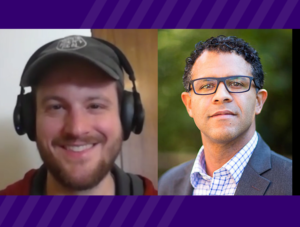 Sometimes the thing you want to learn the most about is part of a system that’s far too complex. Take cells for example. Cells are used all the time to manufacture molecules like insulin and other drugs at scale. That’s because they contain all the enzymes and processes for making those molecules in a nice package. But that package can be limiting because it can only operate in conditions that will keep it alive.
Sometimes the thing you want to learn the most about is part of a system that’s far too complex. Take cells for example. Cells are used all the time to manufacture molecules like insulin and other drugs at scale. That’s because they contain all the enzymes and processes for making those molecules in a nice package. But that package can be limiting because it can only operate in conditions that will keep it alive.
That’s where modern synthetic biology aims to break free. By using “cell-free system” (CFS) tools, researchers look to study biological reactions that happen within cells outside of these limited systems. Chemical engineering and bioengineering professor James Carothers and his lab are developing a CFS platform that can electrochemically drive the bioconversion of carbon dioxide into commercially viable commodities like malic acid. It’s the kind of innovation that could impact polymer, beverages, food, textile, agriculture, and pharmaceutical industries. But how do you scale something like this? How do you penetrate those markets?
MBA candidate Jarod Payne aims to provide answers to those questions. As an undergraduate, he was a geochemist. But his early career focused on projection management and operations in construction. Now, he hopes to learn more about the process of developing something exciting and new.
“I was excited to learn about entrepreneurship in biotechnology, which isn’t an area I have a big background in,” he said. “I’m hoping that what I learn from this program positions me to find a role in the biotech network in Seattle and Pacific Northwest.”
Payne has also considered consulting, but really, his enthusiasm is rooted in being a part of a fast-moving space where you have to address a variety of challenges.
Outside of the fellowship, Payne loves fly fishing and playing bluegrass music.
FELLOWSHIP ALUMS SHARE ADVICE FOR THE NEW COHORT
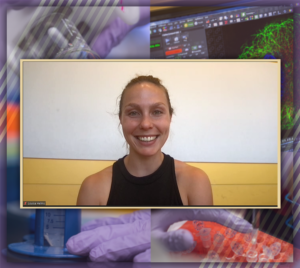 The ITHS/WRF Summer Commercialization Fellowship Program continues to pay huge dividends for alumni. Louisa Helms completed her PhD in Biology in early 2022. The previous summer she was part of the 2021 cohort and worked with Shiri Levy on an innovative computationally-designed protein inhibitor being developed out of the Department of Biochemistry and the UW Institute for Protein Design.
The ITHS/WRF Summer Commercialization Fellowship Program continues to pay huge dividends for alumni. Louisa Helms completed her PhD in Biology in early 2022. The previous summer she was part of the 2021 cohort and worked with Shiri Levy on an innovative computationally-designed protein inhibitor being developed out of the Department of Biochemistry and the UW Institute for Protein Design.
“I got to apply skills that you don’t typically get to use while completing a PhD,” she said. “So, it was just a really nice way to actually practice doing commercial development on a scientific idea and figuring out where it fits. It also very much parlayed into what I’m doing now.”
After graduation, Helms began work as a competitive analyst at a Seattle-based bioscience startup doing many of the things she gained experience doing in the fellowship. She says “using MBA skills and scientific know-how” led her to the job she ultimately wanted.
“The fellowship got me out of my comfort zone. Doing all those customer discovery interviews, forcing myself to talk to people, was so helpful, and it expanded my network,” she said. “It created this comfort level with talking to scientists about science that wasn’t necessarily in my wheelhouse.”
What advice would Helms share with the 2022 cohort and future fellows? “Start reaching out to people to schedule interviews as early as possible. Get used to talking to people and create a list of questions to ask them in advance so you feel comfortable going into it.”
The 2022 cohort will wrap up in late August. More details can be found on startup.uw.edu about the Commercialization Fellowship as well as other fellowships. The Buerk Center also partners with Population Health, the Evans School of Public Policy & Governance, and CoMotion on the Social Entrepreneurship Fellowship program, which launched in 2019. You can learn more about those fellows and their projects on the Population Health website or by clicking on the article link here.
